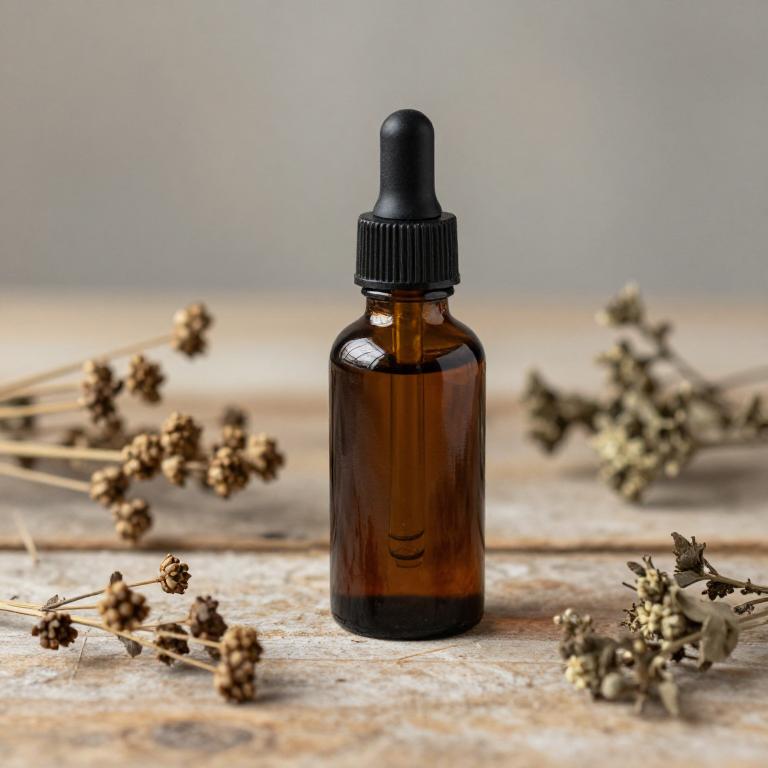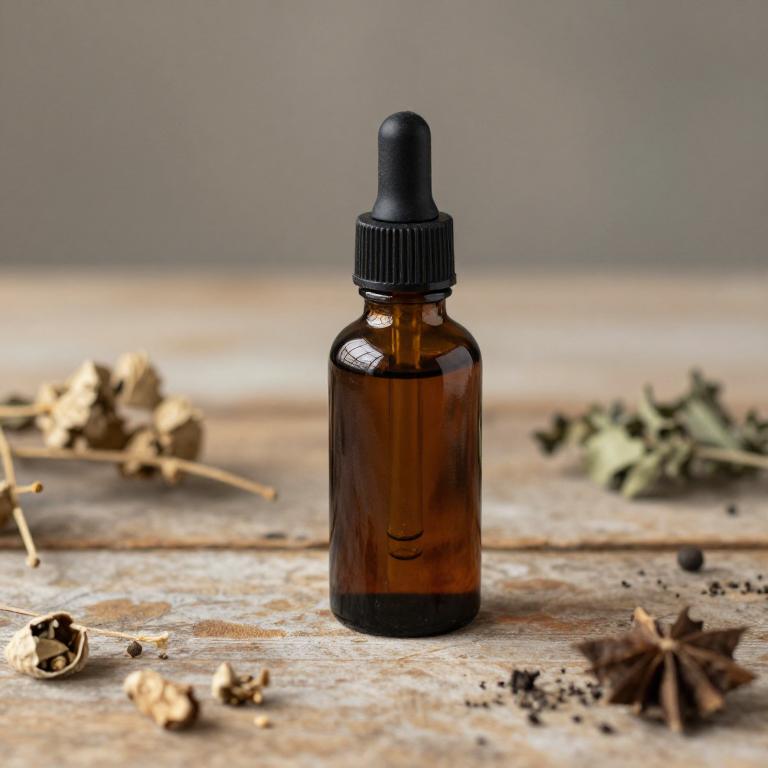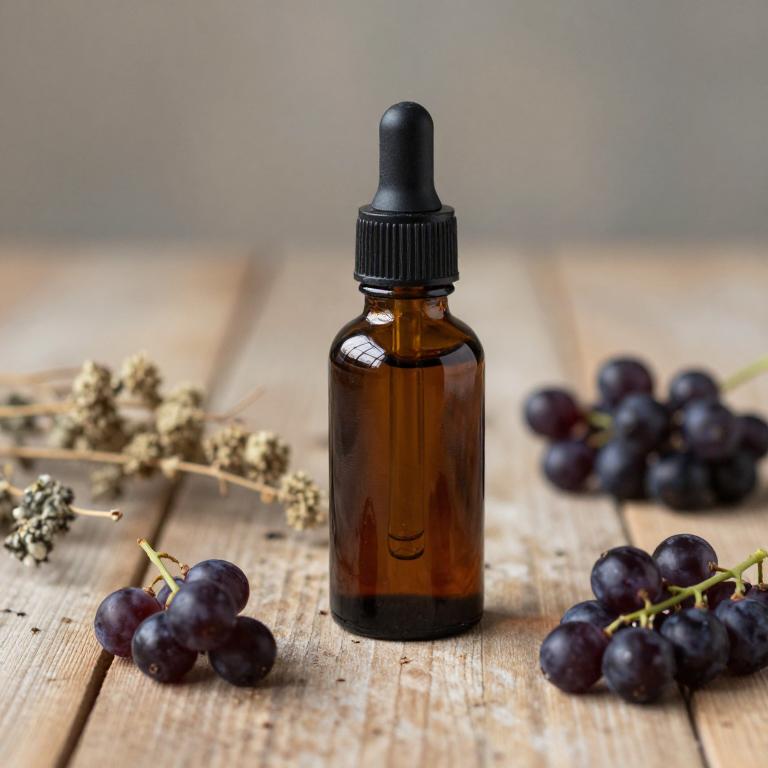10 Best Herbal Tinctures For Arthritis

Herbal tinctures for arthritis are concentrated liquid extracts made by soaking plant materials in alcohol or vinegar, which allows for the extraction of active compounds.
These tinctures are often used as natural alternatives or complementary treatments to conventional arthritis medications. Common herbs used in arthritis tinctures include turmeric, ginger, willow bark, and devil’s claw, all of which are known for their anti-inflammatory and pain-relieving properties. They are typically taken orally in small doses and may help reduce joint inflammation and improve mobility.
However, it is important to consult with a healthcare provider before using herbal tinctures, as they can interact with other medications and may have side effects.
Table of Contents
- 1. Field horsetail (Equisetum arvense)
- 2. Turmeric (Curcuma longa)
- 3. Ginger (Zingiber officinale)
- 4. St. john's wort (Hypericum perforatum)
- 5. Indian frankincense (Boswellia serrata)
- 6. Stinging nettle (Urtica dioica)
- 7. Salvia (Salvia officinalis)
- 8. Chaste tree (Vitex agnus-castus)
- 9. Yarrow (Achillea millefolium)
- 10. Common grape (Vitis vinifera)
1. Field horsetail (Equisetum arvense)

Equisetum arvense, commonly known as field horsetail, has been traditionally used in herbal medicine for its potential anti-inflammatory and analgesic properties.
Herbal tinctures made from Equisetum arvense are often prepared by soaking the dried plant material in alcohol to extract its active compounds, such as silicic acid and flavonoids. These tinctures are sometimes used as complementary therapy for arthritis due to their purported ability to reduce joint inflammation and support cartilage health. However, it is important to note that while some studies suggest possible benefits, more rigorous clinical research is needed to confirm their efficacy and safety.
As with any herbal remedy, it is advisable to consult a healthcare professional before using Equisetum arvense tinctures, especially for individuals with existing medical conditions or those taking other medications.
2. Turmeric (Curcuma longa)

Curcuma longa, commonly known as turmeric, is a traditional herbal remedy that has been used for centuries to alleviate symptoms of arthritis.
Its active compound, curcumin, possesses potent anti-inflammatory and antioxidant properties that may help reduce joint pain and swelling. Curcuma longa herbal tinctures are concentrated liquid extracts that offer a convenient and bioavailable form of curcumin for those seeking natural relief from arthritis. These tinctures are often combined with black pepper extract to enhance absorption, making them more effective.
While they are generally considered safe, individuals should consult a healthcare professional before use, especially if they are on medications or have underlying health conditions.
3. Ginger (Zingiber officinale)

Zingiber officinale, commonly known as ginger, has been traditionally used for its anti-inflammatory and analgesic properties, making it a popular ingredient in herbal tinctures for arthritis.
These tinctures are typically prepared by soaking fresh or dried ginger root in alcohol or vinegar, allowing the active compounds such as gingerol and shogaol to be extracted. The anti-inflammatory effects of ginger tinctures may help reduce joint pain and swelling associated with conditions like osteoarthritis and rheumatoid arthritis. Many individuals use these tinctures as a natural alternative or complement to conventional arthritis treatments, often applying them topically or consuming them orally.
However, it is important to consult with a healthcare professional before using ginger tinctures, especially for those with existing medical conditions or taking medications.
4. St. john's wort (Hypericum perforatum)

Hypericum perforatum, commonly known as St. John's Wort, is a herbal remedy that has been traditionally used for its potential anti-inflammatory and analgesic properties.
When prepared as a tincture, it is often used to support joint health and alleviate symptoms associated with arthritis, such as pain and stiffness. The active compounds in hypericum perforatum, including hypericin and hyperforin, are believed to contribute to its therapeutic effects by influencing neurotransmitter activity and reducing oxidative stress. While some studies suggest it may offer relief for mild to moderate arthritis, it is important to consult with a healthcare provider before use, as it can interact with certain medications.
Overall, hypericum perforatum tinctures are considered a natural alternative for those seeking complementary support for arthritis management.
5. Indian frankincense (Boswellia serrata)

Boswellia serrata, also known as Indian frankincense, is a herbal remedy that has been used for centuries in traditional medicine to support joint health.
Its active compounds, known as boswellic acids, are believed to possess strong anti-inflammatory properties that may help reduce pain and swelling associated with arthritis. Boswellia serrata tinctures are typically made by soaking the resin in alcohol, creating a concentrated form that is easy to absorb into the bloodstream. These tinctures are often used as a natural alternative or complement to conventional arthritis treatments, offering a potentially safer option with fewer side effects.
However, it is important to consult with a healthcare provider before starting any new herbal supplement, especially for those with existing health conditions or taking other medications.
6. Stinging nettle (Urtica dioica)

Urtica dioica, commonly known as stinging nettle, has been traditionally used for its potential anti-inflammatory and analgesic properties, making it a popular choice in herbal tinctures for arthritis management.
When prepared as a tincture, Urtica dioica is typically made by soaking the fresh or dried leaves in alcohol, allowing the active compounds such as flavonoids, phenolic acids, and minerals to be extracted. This herbal remedy is believed to help reduce joint inflammation, ease pain, and improve mobility in individuals suffering from conditions like osteoarthritis and rheumatoid arthritis. However, it is important to consult a healthcare professional before use, as it may interact with certain medications or have side effects in some individuals.
Despite its natural origin, Urtica dioica tinctures should not replace conventional medical treatments but can be considered as a complementary therapy under professional guidance.
7. Salvia (Salvia officinalis)

Salvia officinalis, commonly known as sage, is often used in herbal tinctures to support joint health and alleviate arthritis symptoms.
These tinctures are typically made by infusing the leaves of the plant in alcohol, which helps extract its bioactive compounds such as rosmarinic acid and flavonoids. The anti-inflammatory and antioxidant properties of sage may help reduce inflammation and pain associated with arthritis. Some studies suggest that salvia officinalis can improve mobility and reduce stiffness in individuals with osteoarthritis.
However, it is important to consult a healthcare provider before using sage tinctures, as they may interact with certain medications or have side effects in specific populations.
8. Chaste tree (Vitex agnus-castus)

Vitex agnus-castus, commonly known as chasteberry, is a traditional herbal remedy that has been used for centuries to support hormonal balance and alleviate symptoms of various health conditions.
While it is most commonly associated with menstrual health, some studies suggest that its anti-inflammatory and analgesic properties may offer potential benefits for individuals suffering from arthritis. Vitex agnus-castus tinctures are typically made by soaking the dried fruit in alcohol, which helps to extract the active compounds such as flavonoids and iridoids. These compounds may help reduce inflammation and pain, making the tincture a complementary option for managing arthritis symptoms.
However, it is important to consult with a healthcare provider before using vitex agnus-castus, especially if you are taking other medications or have underlying health conditions.
9. Yarrow (Achillea millefolium)

Achillea millefolium, commonly known as yarrow, has been traditionally used in herbal medicine for its anti-inflammatory and analgesic properties.
Tinctures made from the dried leaves and flowers of this plant are often utilized to help alleviate the pain and swelling associated with arthritis. The active compounds in yarrow, such as flavonoids and essential oils, are believed to support joint health by reducing inflammation and improving circulation. When used as a tincture, yarrow is typically taken orally in small doses, though some formulations may be applied topically to affected areas.
While it is generally considered safe, individuals with bleeding disorders or those on anticoagulant medications should consult a healthcare provider before using yarrow tinctures for arthritis.
10. Common grape (Vitis vinifera)

Vitis vinifera herbal tinctures, derived from the seeds of the grapevine, have gained attention for their potential benefits in managing arthritis symptoms.
These tinctures are rich in resveratrol, a powerful antioxidant and anti-inflammatory compound that may help reduce joint inflammation and pain. Traditional use in herbal medicine suggests that Vitis vinifera can support joint health by improving circulation and reducing oxidative stress in the body. While scientific research is ongoing, some studies indicate that these tinctures may offer natural relief for individuals suffering from osteoarthritis and rheumatoid arthritis.
As with any supplement, it is advisable to consult a healthcare professional before incorporating Vitis vinifera tinctures into a treatment plan for arthritis.